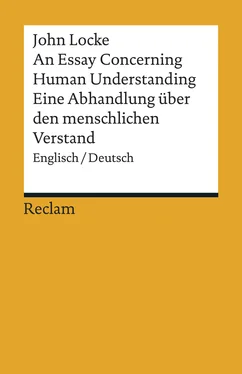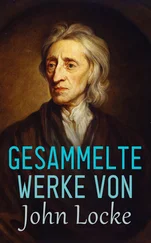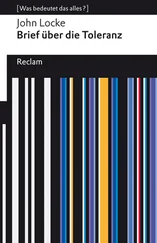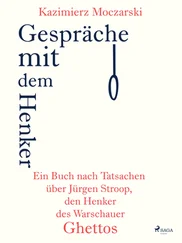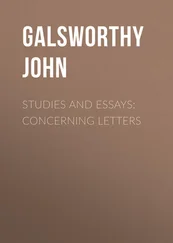§ 5. By this Idea of Solidity, is the Extension of Body distinguished from the Extension of Space. The Extension of Body being nothing, but the cohesion or continuity of solid, separable, movable Parts; and the Extension of Space, the continuity of unsolid, inseparable, and immoveable Parts. Upon the Solidity of Bodies also depends their mutual Impulse, Resistance, and Protrusion . […]
§ 6. If any one asks me, What this Solidity is , I send him to his Senses to inform him: Let him put a Flint, or a Foot-ball between his Hands; and then endeavour to join them, and he will know. […] The simple Ideas we have are such, as experience teaches them us; but if beyond that, we endeavour, by Words, to make them clearer in the Mind, we shall succeed no better, than if we went about to clear up the Darkness of a blind Man’s mind, by talking; and to discourse into him the Ideas of Light and Colours. The Reason of this, I shall shew, in another Place.
Of simple Ideas of divers Senses
THE Ideas we get by more than one Sense, are of Space , or Extension , Figure , Rest , and Motion ; For these make perceivable impressions, both on the Eyes and Touch; and we can receive and convey into our Minds the Ideas of the Extension, Figure, Motion, and Rest of Bodies, both by seeing and feeling. But having occasion to speak more at large of these in another place, I here only enumerate them.
Of simple Ideas of Reflection
§ 1. THE Mind receiving the Ideas , mentioned in the foregoing Chapters, from without, when it turns its view inward upon it self, and observes its own Actions about those Ideas it has, takes from thence other Ideas , which are as capable to be the Objects of its Contemplation, as any of those it received from foreign things.
§ 2. The two great and principal Actions of the Mind, which are most frequently considered, and which are so frequent, that every one that pleases, may take notice of ’em in himself, are these two:
Perception , or Thinking , and
Volition , or Willing .
The Power of Thinking is called the Understanding , and the Power of Volition is called the Will , and these two Powers or [122]Abilities in the Mind are denominated Faculties . Of some of the Modes of these simple Ideas of Reflection, such as are Remembrance , Discerning , Reasoning , Judging , Knowledge , Faith , etc. I shall have occasion to speak hereafter.
Of simple Ideas o f both Sensation and Reflection
§ 1. THERE be other simple Ideas , which convey themselves into the Mind, by all the ways of Sensation and Reflection, viz .
Pleasure , or Delight , and its opposite.
Pain , or Uneasiness .
Power .
Existence .
Unity .
§ 2. Delight , or Uneasiness , one or other of them join themselves to almost all our Ideas , both of Sensation and Reflection: And there is scarce any affection of our Senses from without, any retired thought of our Mind within, which is not able to produce in us pleasure or pain . By Pleasure and Pain , I would be understood to signifie, whatsoever delights or molests us; whether it arises from the thoughts of our Minds, or any thing operating on our Bodies. […]
[…]
§ 7. Existence and Unity , are two other Ideas , that are suggested to the Understanding, by every Object without, and every Idea within. When Ideas are in our Minds, we consider them as being actually there, as well as we consider things to be [124]actually without us; which is, that they exist, or have Existence : And whatever we can consider as one thing, whether a real Being, or Idea , suggests to the Understanding, the Idea of Unity .
§ 8. Power also is another of those simple Ideas , which we receive from Sensation and Reflection . For observing in our selves, that we can, at pleasure, move several parts of our Bodies, which were at rest; the effects also, that natural Bodies are able to produce in one another, occurring every moment to our Senses, we both these ways get the Idea of Power .
§ 9. Besides these, there is another Idea , which though suggested by our Senses, yet is more constantly offered us, by what passes in our own Minds; and that is the Idea of Succession . For if we look immediately into our selves, and reflect on what is observable there, we shall find our Ideas always, whilst we are awake, or have any thought, passing in train, one going, and another coming, without intermission.
§ 10. These, if they are not all, are at least (as I think) the most considerable of those simple Ideas which the Mind has, and out of which is made all its other knowledge; all which it receives only by the two forementioned ways of Sensation and Reflection .
Nor let any one think these too narrow bounds for the capacious Mind of Man to expatiate in, which takes its flight farther than the Stars, and cannot be confined by the limits of the World; that extends its thoughts often, even beyond the utmost expansion of Matter, and makes excursions into that incomprehensible Inane . I grant all this, but desire any one to assign any simple Idea , which is not received from one of those Inlets before-mentioned, or any complex Idea not made out of [126]those simple ones . Nor will it be so strange, to think these few simple Ideas sufficient to employ the quickest Thought, or largest Capacity; and to furnish the Materials of all that various Knowledge, and more various Fancies and Opinions of all Mankind, if we consider how many Words may be made out of the various composition of 24 Letters; or if going one step farther, we will but reflect on the variety of combinations may be made, with barely one of the above-mentioned Ideas , viz . Number, whose stock is inexhaustible, and truly infinite: And what a large and immense field, doth Extension alone afford the Mathematicians?
Some farther Considerations concerning our simple Ideas
§ 1. CONCERNING the simple Ideas of Sensation ’tis to be considered, That whatsoever is so constituted in Nature, as to be able, by affecting our Senses, to cause any perception in the Mind, doth thereby produce in the Understanding a simple Idea ; which, whatever be the external cause of it, when it comes to be taken notice of, by our discerning Faculty, it is by the Mind looked on and considered there, to be a real positive Idea in the Understanding, as much as any other whatsoever; though, perhaps, the cause of it be but a privation in the subject.
§ 2. Thus the Idea of Heat and Cold, Light and Darkness, White and Black, Motion and Rest, are equally clear and positive Ideas in the Mind; though, perhaps, some of the causes [128]which produce them, are barely privations in those Subjects, from whence our Senses derive those Ideas . These the Understanding, in its view of them, considers all as distinct positive Ideas , without taking notice of the Causes that produce them: which is an enquiry not belonging to the Idea , as it is in the Understanding; but to the nature of the things existing without us. These are two very different things, and carefully to be distinguished; it being one thing to perceive, and know the Idea of White or Black, and quite another to examine what kind of particles they must be, and how ranged in the Superficies, to make any Object appear White or Black. […]
Читать дальше
